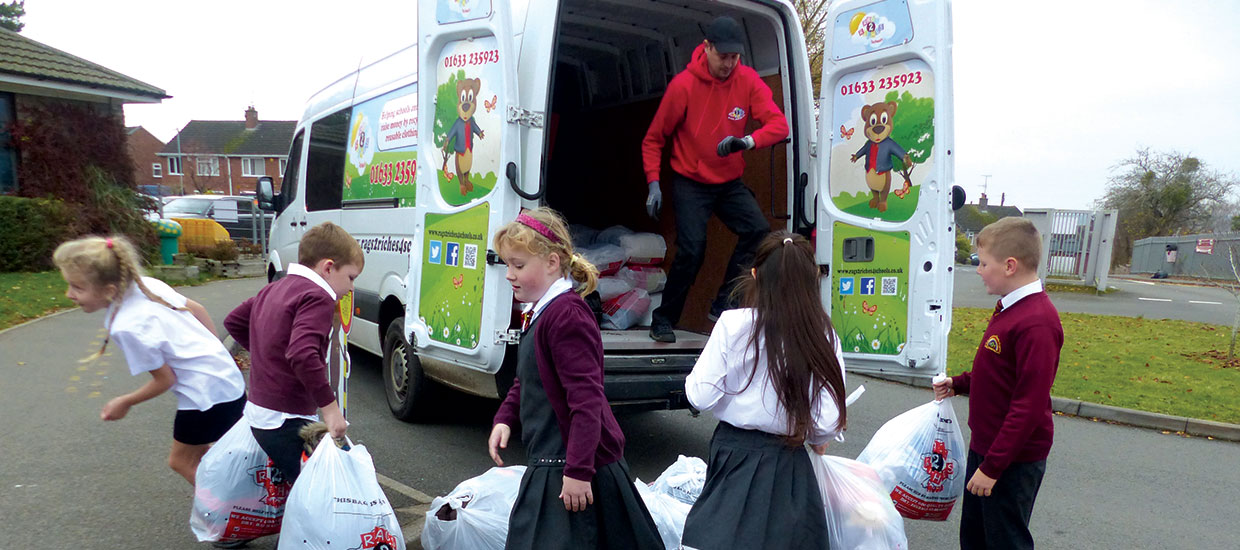Raise revenue by recycling
Recycling schemes are an easy way to combine waste reduction with fundraising, says Heather Park

If you hate the idea of creating a legacy of landfill for future generations, then why not make recycling part of your income generation strategy? There are a range of schemes to choose from. You could even run several concurrently to increase revenue. Most programmes provide free media resources to help publicise the launch of your school recycling initiative. All you need to do is site a collection box in a visible and accessible location, promote your scheme regularly and send off your recycling once you have enough.
Textiles
Approximately 350,000 tonnes of used, but still wearable, clothing is sent off to landfill in the UK every year, equating to more than 30% of our unwanted clothes.
Schools can create fantastic opportunities to help reduce this figure by hosting textile recycling schemes. Children can quickly grow out of clothes, so you would be helping parents put these to good use, as well as raising funds that could be ploughed back into their school.
In addition to clothes, other textiles and products such as curtains, bedding, shoes, bags and soft toys can all be recycled. The textile recycling company Rags 2 Riches (rags2riches4schools.co.uk) operates across the UK and offers free collection bags for you to send home to parents. The company will pick up items and weigh them at the school, with an aim to pay within a week. Payment rates vary according to market fluctuations, but Rags 2 Riches typically gives 50p per kilo and £500 per tonne.
Printer cartridges
Ink cartridges take 1,000 years to decompose in landfill. Yet more than 40 million inkjet cartridges are dumped each year in the UK, with 1.1 billion thrown away worldwide.
Industry analysts estimate that a spent cartridge can be reused or remanufactured up to seven times, creating less landfill and using less energy and fewer resources to make new cartridges. The recycling company Empties Please (emptiesplease.com/schools) is keen to both encourage younger generations to be green and help schools raise funds. It will collect used cartridges from your school and donate the money straight back, paying around £1 for every ink cartridge successfully recycled. ‘Green points’ are also awarded for every £1 raised. These can be saved and redeemed against eco goodies such as bulbs, trees and wildlife houses. For maximum impact, don’t stop at the cartridges used by parents and in school. Increase profits further by appealing to nearby businesses for their used cartridges, or by asking them to host a collection box. More than 1,500 schools have signed up to Empties Please, which posts regular updates and bulletins for collectors. For instance, in just one month last year, participating schools raised £2,428.20, and 49 new schools joined its scheme.
Media and electronics
Companies such as Music Magpie (musicmagpie.co.uk) pay for old DVDs, CDs, games and electronics. Simply enter the barcodes of items on the website (or scan them through an app) to see how much they are worth. Then box them up and send them off via Freepost. CEX (uk.webuy.com) and Ziffit (ziffit.com) also recycle media and electronic products. It’s a good idea to research the market to see who pays the most – and for what. To avoid the time-consuming task of checking each item individually, research a cross section of donations to establish which company generally gives the most profit.
TerraCycle
Nearly all types of plastic can be recycled, but whether this actually happens comes down to the facilities and technology available to your local council.
This is where TerraCycle comes in. TerraCycle is an international programme that allows you to earn funds by recycling the ‘non-recyclable’, which includes coffee capsules, pens, crisp packets and even toothpaste tubes. TerraCycle offers free recycling programmes funded by brands around the world, so you can choose the ones that best suit your school and community.
Many brands offer TerraCycle points to collection locations, which are redeemable for 1p per point. While not necessarily the biggest earner, you will be taking big steps to reduce the amount of waste going to landfill or incineration. You can either enrol your school as a collection point, or collect recyclable goods and take them to your nearest location, which can be found on the website terracycle.com/en-GB. TerraCycle can provide free resources, including posters and guides, to inspire your pupils in their recycling efforts, so you could use this as a learning opportunity for pupils by creating an eco council to encourage collections.
The problem with plastic
- Since 1950, the quantity of plastic produced has doubled approximately every 15 years
- 79% of all plastic ever made has become litter or landfill
- Of the 6.3bn metric tons of plastic waste that exists, only nine per cent has been recycled
- Out of the 2.26m tonnes of plastic packaging waste produced in the UK in 2017, less than half was recycled or recovered
- Half of all plastic manufactured becomes rubbish less than a year after it is made
We raised £149 with Rags 2 Riches
The school community at St Bartholomew’s CofE Primary School and Nursery in Worcestershire (270 pupils) has rallied behind the PTA’s campaign to raise more than £20,000 for new play equipment, recently collecting 70 bags of high-quality secondhand clothes in exchange for 50p per kilo from Rags 2 Riches 4 Schools. The Friends of St Bartholomew’s were delighted to generate £149.50 from the collection.
Headteacher Ian James said: ‘The Friends of St Bartholomew’s has set an ambitious target and are working brilliantly to generate funds through opportunities such as the Rags 2 Riches project. They have already raised over £6,000 towards the new play equipment and the children are getting very excited as the project starts to feel real.’
More on going green
